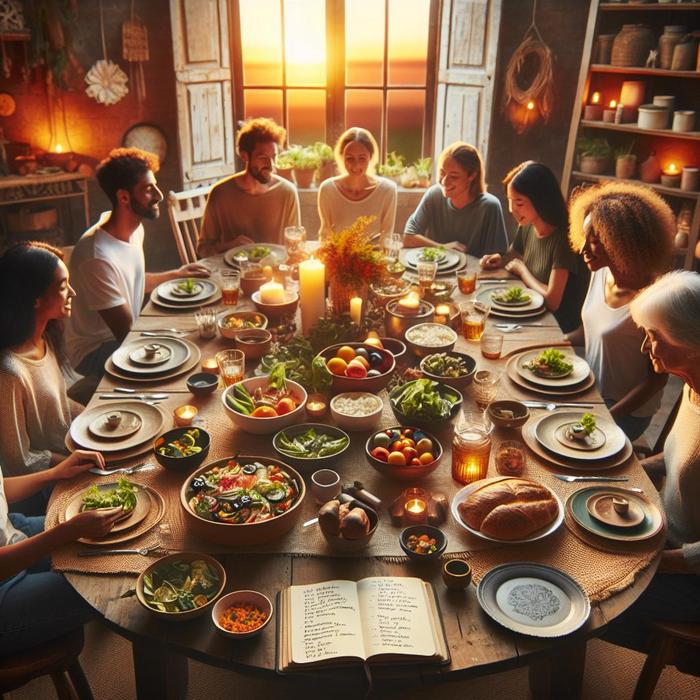The Significance of Family Dinners
Family dinners may seem like an age-old tradition, but they hold a value that transcends time. It’s not just about the meal, it’s about bringing people together. It’s a time for catching up, exchanging ideas, and enjoying each other’s company. It’s about creating routines, bonding over meals, and building family traditions that can last a lifetime.
The Proven Benefits of Family Dinners
Researchers have found fascinating connections between regular family dinners and a variety of positive outcomes. In fact, the Center on Families at Purdue University has devoted an entire initiative to the Family Dinner Project, given the extensive evidence pointing to the benefits of consistent family meals. Among these benefits are:
- Mental health improvements: Regular family meals have been linked to lower rates of depression, anxiety, and other mental health issues in both children and adults. Conversation and connection at the dinner table can provide a sense of belonging and stability.
- Enhanced academic performance: Several studies have found a correlation between children who participate in regular family dinners and higher grades in school.
- Better nutrition: Home-cooked meals tend to be healthier than fast food or restaurant meals, leading to better overall nutrition and lower rates of obesity.
- Increased resilience: Regular family dinners can help children build resilience by providing a consistent, dependable routine.
- Stronger family bonds: Ultimately, sharing regular meals allows family members to connect on a deeper level, strengthening their bonds and creating lasting memories.
Creating Meaningful Routines
As parents, we strive to foster an environment that nurtures our children emotionally and mentally. And creating routines like family dinners is a fundamental way to achieve this. Routines offer a sense of security to children as they can clearly perceive what is expected of them. Moreover, with the hustle and bustle of today’s fast-paced life, these shared meal times can turn into a sanctuary of laughter, connection, and love. We’ve been diligently focusing on teaching empathy to our kids, and we find family dinners a perfect time for practicing it.
Bonding Over Meals
Meal times are not just about feeding our bodies; they’re about feeding our hearts and minds as well. It’s an opportunity for hearty conversations, sharing experiences, and fostering a culture of gratitude. One of the tips shared by The Scramble on getting kids to talk at the dinner table is to engage them in the preparation process. This way, they not only learn valuable skills but also feel a sense of contributions to the family meal, encouraging more active participation in discussions.
Creating Lasting Family Traditions
Family traditions are the glue that holds a family together. They create a collective identity and a sense of belonging. Family dinners can turn into a precious family tradition, where everyone shares their day, discusses their worries, and celebrates their achievements. It’s by these traditions we encourage hand-eye coordination in our toddlers or discuss our experiences in building a neighborhood parenting tribe.
Bringing the Family Together
Family dinners are a great opportunity to bring everyone together, strengthening relationships and promoting open communication. If a family member is struggling with a problem or feeling detached, sharing a meal can serve as a welcome distraction and an opportunity to reconnect. According to The Family Dinner Project, having a shared meal can diminish feelings of loneliness and isolation.
Discussing Important Matters
Family dinners also serve as a platform to discuss crucial matters, such as important family decisions or current events. It is an ideal setting for children to express their views, learn about their parents’ perspectives, and develop critical thinking skills. These times allow for unrestricted conversation, fostering lively interaction and mutual understanding.
Nurturing Positive Behavior
Family dinners are more than just about providing a healthy meal. They shape behaviors, influence life choices, and instill values, particularly in children. Researchers from the That Organic Mom site suggest that children who regularly have family meals are less likely to engage in risky behavior like substance abuse.
Creating a Safe Environment
During these shared meals, a safe and nurturing environment is created, where children feel comfortable to share their thoughts, feelings, and concerns. This secure atmosphere can significantly help in the character-building process, contributing to the development of confident and well-rounded individuals.
Building last Memories
The memories created during these family meals are long-lasting. They form the cornerstone of your family’s stories and shared experiences—establishing a family culture that cherishes togetherness and creates a vibrant family history.
Everyday Healing and Growth
The dinner table is also an excellent platform for healing and growth, letting everyone express their emotions and addresses conflicts in a constructive and compassionate environment. The Family Dinner Project emphasizes how storytelling at the dinner table can help kids become more resilient.
A Tradition of Love and Care
In essence, the tradition of family dinners centers on love, nurturing, and care. It reinforces the notion of family solidarity, builds mutual trust and respect, and encourages harmonious living. The impact of these shared meals transcends physical sustenance, significantly affecting the emotional well-being of everyone involved.
Our Recipe for Meaningful Family Dinners
Family dinners in our home are more than just meals; they are bonding sessions – our recipe includes a dash of laughter, a dollop of love, generous helpings of understanding, and heaps of nourishing attention. This recipe has helped us create meaningful family dinners, fostering a culture of warmth, togetherness, and acceptance.
Making Family Dinners a Priority
Given the many profound benefits, we prioritize family dinners within our family culture. It’s a time to leave behind the hustle and bustle of daily life and focus on what truly matters—our family. Though it can sometimes be challenging to manage with our jam-packed schedules, we’ve found the investment of time and energy in these shared meals highly worthwhile.

